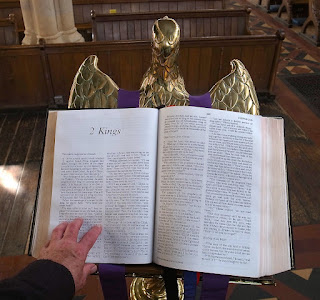Cranmerian Holy Communion during Advent: attending to the Scriptures with Israel
And to all thy people give thy heavenly grace; and specially to this congregation here present; that, with meek heart and due reverence, they may hear, and receive thy holy Word ...
Continuing this short series reflecting on how aspects of Cranmerian Holy Communion have a particular meaning and resonance during Advent, we turn to these words from the Prayer for the Church Militant. There is, of course, a particular echo here during the second week of Advent:
Blessed Lord, who hast caused all holy Scriptures to be written for our learning: Grant that we may in such wise hear them, read, mark, learn, and inwardly digest them ...
Note how the collect begins with hearing of the Scriptures and that the Prayer for the Church Militant likewise prioritises hearing: communal hearing not private reading is the focus of both petitions. This contrasts rather sharply with Simon Schama's comment in his The History of the Jews: Finding the Words, 1000BCE-1492CE that whereas Christian reading of scripture is "done in silent solitude (the invention of monastic Christianity)", Jewish reading of scripture "is literally loud-mouthed ... a demonstrative public performance". For Schama, it is this public reading of the scriptures which defines a fundamental characteristic of the Jewish people, "a community of the attentive".
The Prayer for the Church Militant in Cranmerian Holy Communion sets before us an understanding of the Church, and of the congregation, as attending with Israel, like Israel, to the scriptures: a community which hears the public reading of scripture, a practice of must greater importance than any private reading in silent solitude.
For the Book of Homilies, in the 'Homily for repairing and keeping clean, and comely adorning of churches', the building of churches reflects the fact that the congregation is called to be, like Israel, "a community of the attentive":
to the intent ye may understand further, why Churches were built among Christian people, this was the greatest consideration: that God might have his place, and that God might have his time, duly to be honoured and served of the whole multitude in the parish. First there to hear and learn the blessed word and will of the everlasting God.
Likewise the bidding at Mattins and Evensong declared, that we "assembly and meet together ... to hear his most holy Word". For Hooker, "the readinge of holie writ" was not the "bare readinge" condemned by his Puritan opponents for the absence of a sermon (LEP V.22.1). Not so, says Hooker, for "The Church as a wittnesse preacheth his meere revealed truth by reading publiquely the sacred scripture" (V.191). Preaching, while an ordinance to be esteemed, was not equal to such reading:
Wherefore when we reade or recite the scripture, we then deliver to the people properlie the word of God. As for our sermons, be they never so sound and perfect, his worde they are not as the sermons of the prophetes were, no they are but ambiguouslie termed his worde (V.22.10).
Jeremy Taylor echoes Hooker when he says that "the sermons or homilies written or spoken by men, are but the words of men, or rather explications of, and exhortations according to, the word of God; but of themselves they are not the word of God". He goes on to similarly emphasise the priority of hearing the scriptures read in the congregation:
Fail not diligently to attend to the reading of Holy Scriptures upon those days wherein it is most publicly and solemnly read in churches, for at such times, besides the learning our duty, we obtain a blessing along with it.
The Epistle for the Second Sunday in Advent, Romans 15:4-13, opens by placing the Church alongside Israel, attending to the scriptures:
Whatsoever things were written aforetime were written for our learning; that we through patience and comfort of the Scriptures might have hope.
It points to how Advent calls the Church to be, like Israel across long centuries of defeat, exile, failure, and waiting, "a community of the attentive", the community which is formed and reformed through hearing the reading of the scriptures. This, by the way, demonstrates why Cranmer's collect, 'Blessed Lord, who hast caused all holy Scriptures to be written for our learning', is rightly prayed in the season of Advent (in contrast to most contemporary Anglican liturgies): it illuminates the Advent quality of this hearing of the scriptures, after the example of Israel.
During the weeks of Advent, therefore, the petition from the Prayer for the Church Militant beautifully, quietly calls the Church to sit alongside Israel, hearing the reading of the scriptures as "a community of the attentive". Much more than any additional seasonal material, it sets before us what it is to be a community oriented towards the Advent of the Lord, for this means that we must be a community gathered around and hearing the reading of the scriptures.




Comments
Post a Comment